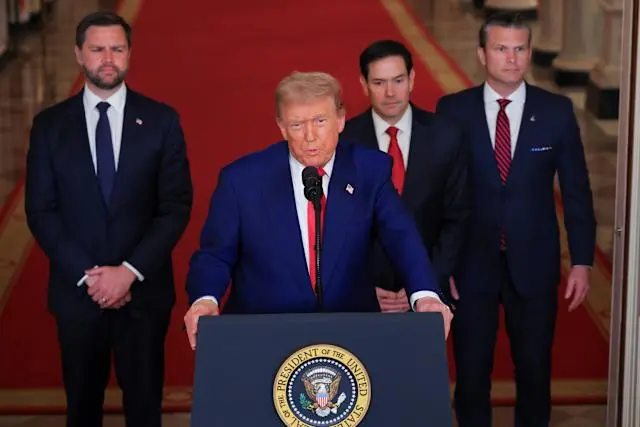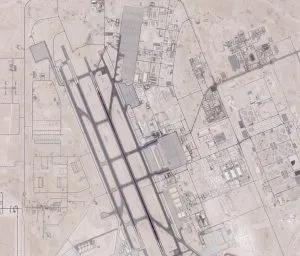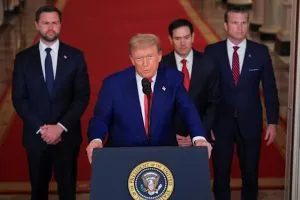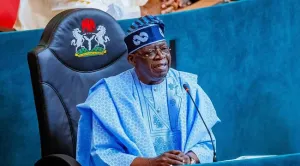Trump Vows to Bomb Iran Again if Nuclear Activities Resume

In a bold and provocative statement, President Donald Trump declared on Friday that the United States would launch further airstrikes on Iran if the country resumes uranium enrichment at levels deemed concerning by the U.S. government. The announcement comes in the wake of recent U.S. airstrikes that targeted three Iranian nuclear facilities, an operation Trump claimed “completely obliterated” Iran’s nuclear weapons program. However, Iran’s atomic energy chief has hinted at plans to rebuild the nation’s nuclear infrastructure, escalating tensions in an already volatile region.
Speaking from the White House, Trump issued a stern warning to Iran’s leadership, stating, “If they start up their nuclear program again, we will bomb them with a force the likes of which they have never seen before.” He emphasized his administration’s commitment to preventing Iran from developing nuclear weapons, echoing long-standing U.S. and Israeli concerns about Tehran’s nuclear ambitions. Trump also reiterated his openness to negotiating a new nuclear deal but warned that Iran must comply fully or face severe consequences.
The recent U.S. airstrikes, which targeted key nuclear facilities, including enrichment sites and research centers, were described by U.S. officials as a preemptive measure to halt Iran’s progress toward a nuclear weapon. While Trump hailed the operation as a decisive blow, Iranian officials have downplayed the damage and vowed to rebuild. Iran’s atomic energy chief, Mohammad Eslami, stated in a televised address that “arrangements are being made” to restore the country’s nuclear capabilities, though he provided no specific timeline or details.
The tit-for-tat escalation has heightened fears of a broader conflict in the Middle East. In retaliation for the U.S. strikes, Iran launched a limited missile attack on a U.S. military base in Qatar earlier this week, causing minor damage and no reported casualties. The attack was seen as a symbolic gesture, but it underscored Iran’s willingness to respond militarily, raising concerns about a potential cycle of violence.
Public and international reactions to Trump’s latest remarks have been sharply divided. On social media platforms like X, some users expressed alarm over the prospect of further military escalation, with posts highlighting the risks of a full-scale war. “Trump’s rhetoric is dangerously reckless—bombing Iran again could ignite a regional catastrophe,” one X user wrote. Others, however, supported the president’s hardline stance, arguing that Iran’s nuclear ambitions pose an existential threat to global security. “The U.S. and Israel have every right to stop Iran’s nuclear program by any means necessary,” another user posted.
Analysts note that the current standoff is rooted in years of mistrust between the U.S. and Iran, exacerbated by the U.S. withdrawal from the 2015 Joint Comprehensive Plan of Action (JCPOA) under Trump’s first administration. The JCPOA, commonly known as the Iran nuclear deal, had imposed strict limits on Iran’s nuclear activities in exchange for sanctions relief. Since its collapse, Iran has gradually scaled back its commitments, increasing uranium enrichment and restricting international inspections, moves that have alarmed Western powers.
International responses to Trump’s statement have been cautious. European allies, including France and Germany, urged restraint and called for diplomatic efforts to de-escalate tensions. “Military actions risk destabilizing the region further,” a spokesperson for the European Union’s foreign affairs office said. Meanwhile, Israel, a key U.S. ally and long-standing opponent of Iran’s nuclear program, expressed support for the U.S. position. Israeli Prime Minister Benjamin Netanyahu stated, “We stand with the United States in ensuring Iran never acquires nuclear weapons.”
The situation remains fluid, with no immediate resolution in sight. Iran’s leadership has signaled it will not bow to U.S. pressure, while Trump’s administration appears resolute in its approach. As both sides dig in, the international community watches closely, wary of the potential for further escalation in an already volatile region. For now, the world waits to see whether diplomacy or military action will define the next chapter in U.S.-Iran relations.







